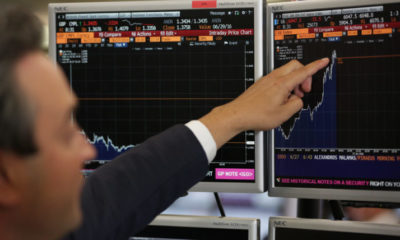Markets
European Stocks Fall on Central Bank Angst
Published
9 years agoon

- European Stocks Fall With Emerging Markets
European stocks fell with emerging markets as the prospect of monetary policy turning less accommodative in the world’s biggest economies damped appetite for higher-yielding assets.
The Stoxx Europe 600 Index dropped for the first time in seven days and the MSCI Emerging Markets Index halted a two-day rally after report an informal consensus was building in the European Central Bank that quantitative easing will need to be tapered once a decision is taken to end the program. Spanish and Italian bonds extended a selloff in euro-area debt markets, while Treasuries held a three-day drop after Federal Reserve officials talked up the chance of a U.S. interest-rate increase in 2016. The pound touched a five-year low against the euro while oil rallied after data indicated American stockpiles shrank.
Funds poured into riskier assets this year as supportive monetary policies in the world’s biggest economies spurred demand for higher-yielding investments. That’s left markets vulnerable to a selloff as central banks in Europe and Japan show signs of wanting to dial back their unprecedented stimulus and the case for a U.S. interest-rate increase builds. When the Fed indicated it was reducing asset purchases in 2013, it sparked a so-called taper tantrum leading to a surge in bond yields.
“The central bank may be trying to test the market, see how it reacts to this sort of news and lift some of the pressure we’ve had on the banking sector,” said William Hobbs, head of investment strategy at Barclays Plc’s wealth-management unit in London. “They may have come to the realization that monetary policy isn’t helping the banking sector, which may ultimately make it counter-productive.”
Stocks
While the Stoxx Europe 600 Index fell 1 percent at 11:53 a.m. in London, a gauge of banks was little changed. Yield-sensitive industries including telecommunications, utilities and real estate were among the biggest decliners on the Stoxx 600. The number of shares changing hands was about 18 percent higher than the 30-day average.
Tesco Plc helped limit losses among retailers, jumping 13 percent after reporting first-half profit that beat analysts’ estimates. Delta Lloyd NV rallied 29 percent after NN Group offered to buy the company for 2.4 billion euros ($2.7 billion) in cash to boost scale in the pensions and insurance sectors. NN Group slid 0.8 percent.
Data Wednesday showed the euro region’s economy is losing steam, with a Purchasing Manages’ Index for the manufacturing and services sector falling in September from August.
The MSCI Emerging Markets Index fell 0.4 percent following a 1.3 percent advance over the previous two days. Shares in Asia led losses, with the Philippines and Indonesia dropping more than 0.9 percent.
The Hang Seng China Enterprises Index of Chinese companies listed in Hong Kong rose for a third day, advancing 0.6 percent. The Hang Seng Index added 0.6 percent, with trading volumes 27 percent less than the 30-day average amid a week-long holiday in mainland China.
S&P 500 Index futures were little changed after U.S. stocks fell 0.4 percent on Tuesday. Among economic data scheduled for Wednesday, the focus will be on the ADP Research Institute’s employment figures, services and manufacturing reports, as well as orders for durable goods.
Currencies
The pound touched a five-year low versus the euro, staying weaker even as a report showed the services industry grew more than economists forecast last month, in another sign of the economy’s resilience following the June vote to leave the European Union. Sterling was 0.2 percent weaker at 88.22 pence per euro.
The British currency has tumbled against all of its major counterparts this week after Prime Minister Theresa May signaled the U.K. is prepared to surrender membership of Europe’s single market. May is due to speak again on Wednesday at the conclusion of her Conservative Party’s annual conference.
The Bloomberg Dollar Spot Index was little changed, after gaining 0.6 percent in the last session. The yen fluctuated following a 1.2 percent drop versus the greenback on Tuesday.
New Zealand’s dollar sank to a seven-week low after global dairy prices fell. Average prices for whole milk powder, the nation’s chief farm export, fell 3.8 percent at Tuesday’s GlobalDairyTrade auction.
Bonds
Spain’s 10-year bond yield climbed three basis points to 1.00 percent as traders digested the potential for an ECB taper. Italian yields rose three basis points to 1.34 percent, a day after the nation sold 50-year bonds for the first time. Benchmark German 10-year bond yields increased three basis points to minus 0.02 percent.
The yield Treasury 10-year notes rose one basis point to 1.70 percent, after climbing six basis points on Tuesday. Following hawkish comments from Fed officials, the odds of an interest rate increase this year have risen to 61 percent, up about 11 percentage points from last week, though futures indicate only a 21 percent chance of a move coming when the next meeting concludes on Nov. 2.
Richmond Fed chief Jeffrey Lacker may argue for the second time this week in favor of an interest-rate rise when he speaks Wednesday. Fed Bank of Chicago President Charles Evans said borrowing costs could be raised as early as November and his counterparts for Richmond and Cleveland spoke over the last two days in favor of a hike.
Emerging-market bonds fell relative to their developed-nation counterparts. The emerging-market debt yield premium over U.S. Treasuries widened two basis points to 329, rising from lowest since Sept. 8, according to JPMorgan Chase & Co. indexes.
Commodities
Crude oil rose as much as 1.8 percent to $49.53 a barrel in New York, the highest since June 30. Inventories dropped by 7.6 million barrels last week, the American Petroleum Institute was said to report, before official data on Wednesday that’s forecast to show stockpiles increased. A deal between major producers could trim output by 1.2 million barrels a day and boost prices by as much as $15 a barrel, according to Venezuela’s oil minister.
Gold for immediate delivery rose 0.4 percent, after a 3.3 percent plunge in the last session that marked its steepest slide in a year. Industrial metals declined in London, with copper, nickel and lead declining for a third day.
“It does appear that the market is a bit jittery over prospects for a global exit from central bank stimulus,” said Ric Spooner, a chief market analyst at CMC Markets in Sydney. “For metals there’s a concern that the main impact would be a stronger dollar” as most commodities are priced in the currency, he said.
Natural gas for same-day delivery rose 13 percent in London after gaining 29 percent on Tuesday as a cold snap is expected to boost demand for the heating fuel.
Is the CEO and Founder of Investors King Limited. He is a seasoned foreign exchange research analyst and a published author on Yahoo Finance, Business Insider, Nasdaq, Entrepreneur.com, Investorplace, and other prominent platforms. With over two decades of experience in global financial markets, Olukoya is well-recognized in the industry.

You may like
-
EU Raises Tariff on Chinese Electric Vehicles by 35%
-
Stoxx 600 Falls as Tech Sector Drags Down European Markets
-
G-7 Faces Saudi Resistance on Russian Asset Seizure Plans
-
Euro Drops Amid Projections of Left-Wing Win in French Elections
-
Euro Dips to Month-Long Low After Macron Calls Snap Vote
-
EU Secures €50bn Financial Support for Ukraine as Orbán Lifts Veto















